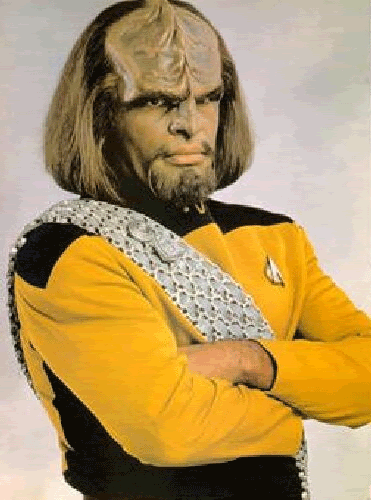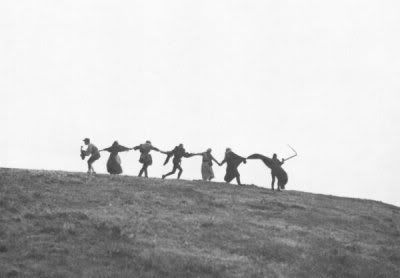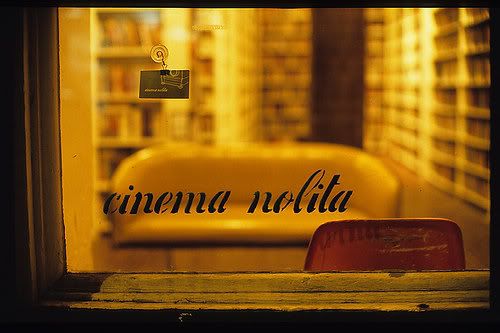Monday, July 30, 2007
Friday, July 13, 2007
A little about myself

Andrew recently tagged me in the spreading-like-wildfire Eight Simple Things meme, the rules for which are as follows.
1. First, those tagged must explain the rules, as I am currently doing.
2. Secondly, share no more or less than eight facts about yourself.
3. Thirdedly, tag eight of your unsuspecting blogger friends, who are thereby contractually bound by law to do the same. If you do not comply, you will be fed to the crocodiles.
Anyhoo:
1) I share the same birthday (March 27th) as Nathan Fillion, Michael York, and Quentin Tarantino.
2) I made my first movie at the age of seven - a hand-drawn animation for a zoetrope of a man blowing up an enormous bubble gum bubble which popped all over his face. At the time, I had never actually chewed a piece of bubblegum in my life (it's not as easy to come by in England), I had only seen it in cartoons.
3) I met Meryl Streep at the opening to her husband Don Gummer's exhibition at MASS MoCA. She was very sweet and kind, despite probably having talked to the entire population of the Berkshires in a single evening. I, on the other hand, was a completely star-struck, shy doofus. Oh well.
3. Thirdedly, tag eight of your unsuspecting blogger friends, who are thereby contractually bound by law to do the same. If you do not comply, you will be fed to the crocodiles.
Anyhoo:
1) I share the same birthday (March 27th) as Nathan Fillion, Michael York, and Quentin Tarantino.
2) I made my first movie at the age of seven - a hand-drawn animation for a zoetrope of a man blowing up an enormous bubble gum bubble which popped all over his face. At the time, I had never actually chewed a piece of bubblegum in my life (it's not as easy to come by in England), I had only seen it in cartoons.
3) I met Meryl Streep at the opening to her husband Don Gummer's exhibition at MASS MoCA. She was very sweet and kind, despite probably having talked to the entire population of the Berkshires in a single evening. I, on the other hand, was a completely star-struck, shy doofus. Oh well.
4) There is a shot of Lizzie Straus's character pulling on her rubber gloves in Roads, the short film I made as my high school senior exhibition, which was a deliberate homage to Amelie. There was also a similar scene in my parodic sci-fi film Martian Invaders from Mars where Matthew Diamante's Leslie Neilsen-esque doctor pulls on his gloves before going to work on an alien autopsy. The unfortunate effect of this trend is that everyone who watches my movies now thinks I have some sort of sexual rubber glove fetish. Which, incidentally, I do not.
5) I have an embarrassing and unexplainable fear of aquariums, and more specifically, the big, ugly, scary-looking fish that lurk in them. I even have to tread carefully around the Ocean Creatures display at the New York Museum of Natural History, which is one of the many reasons I thought The Squid and the Whale was such a lovely, poignant little film.
6) As a child, I had a lisp so heavy it resembled a mixture of Hebrew and Klingon.
7) I'm not at all religious, just spiritual, but if there's anyone I think of as a "spiritual hero" it's Johnny Cash; a brilliant artist whose faith was inseparable from his work, but always presented in an unpretentious, honest, and never holier-than-thou manner. In fact, I think if the majority of the world's organized religious leaders "walked the walk," spiritually speaking, the way that Johnny did, the world would be in a helluva lot better shape.
8) Although primarily a filmmaker, I have been known to dabble in other artistic outlets, such as hip hop.
And for the passing of the torch, I tag Jules, Arran, Stacie, Kim, Phelpster, Tom, Paul and Wiley.
Wednesday, July 04, 2007
Five Films for the 4th

Forget Will Smith and the great big alien mothership - here are four films which are better suited to grace your DVD player on Independence Day than any other day of the year. What sets a Great Movie About America apart from what are simply Great American Movies its its ability to pick apart our society and the myths and harsh realities associated with it, while simultaneously celebrating its spirit - a national identity which is admittedly like none other in the world.
Nashville (1975, dir. Robert Altman) - the first film which immediately sprang to my head while making this list, and for good reason. Altman presents the glittering Country-Western Captial of the World, over the course of a few hectic days, as a microcosm of America. Following the intersecting stories of some 20-odd protagonists, both superstars and nobodies, the film beautifully captures the chaotic spirit of an America which was doing its best to be cheerful on its bicentennial anniversary, following the assasination of JFK and the Vietnam War. As Henry Gibson's character Haven Hamilton earnestly croons during the opening credits, "we must be doing something right / to last 200 years." But what exactly that is, it's pretty hard to say.
Patton (1970, dir. Franklin J. Schaffner) - scripted by a then-unknown Francis Ford Coppola, this is one of the rare war movies that manages to appeal to the Sands of Iwo Jima fans as well as the Full Metal Jacket crowd. As played by George C. Scott, real-life WWII general George S. Patton Jr. was only marginally less crazy than Dr. Strangelove's Buck Turgedson; a brilliant military strategist for whom the existence of war was the only thing which kept him from being an aimless, Beckettian drifter. Whether you read this film as a right-wing Valentine's card to a historic legend, or an ironic meditation on the nature of war and warlike people, you can't help but be moved when Patton, joined by his dog, walks off towards the windmills at the film's finale - a modern day Don Quixote in a world that no longer needs him.
25th Hour (2002, dir. Spike Lee) - following September 11th, while the rest of the entertainment industry were hard at work editing shots of the Twin Towers out of the opening of "Friends" and ensuring that Escape from New York and Dino DeLaurentiis's King Kong remake were never shown on TV ever again, Spike Lee was making a film which not only acknowledged the absence of the World Trade Center, featuring prominant shots of Ground Zero, but presented the personal tragedy of one man as a microcosm of post-9/11 America. When drug dealer Monty (Edward Norton) is arrested and facing a seven-year jail term, all the great questions surrounding love, family, community and duty come crashing down on his head during his last 24 hours of freedom. Despite Lee's reputation as a "soapbox director," the political subtext of this story is handled with grace and subtlety, while still retaining its heartbreaking power.
Scarface (1983, dir. Brian De Palma) - the tagline of this decadent, bombastic three-hour crime epic sums up the whole thing perfectly: "He loved the American Dream. With a vengeance." Those who pooh-pooh this movie and claim it isn't as good as The Godfather are missing the point - this was never meant to be a film with the meditative, Shakespearean tragedyesque power of Coppola's trilogy - this is a movie of raw, sledgehammer-to-the-face power that bludgeons us over the head with the all-too-American mantra that sometimes, you want what the other guy's got. Pacino's Tony Montana is simply a man who sought to remedy that desire. It's not exactly a noble goal, but one can't help but admire his honesty about getting what he wants. And when it turns out, as it often does, that money doesn't buy him happiness, but results in his downfall, one not only thinks of the scores of Cagney and Bogart gangsters who fell swiftly from their place at "the top of the world," but also of Charles Foster Kane, dying alone in his mansion after alienating everyone he loves. It's about as American a film as one can get.
King Kong (1933, dir. Merian C. Cooper and Ernest B. Shoedsack) - as a foreigner to these shores myself, few things are able to tug at my heartstrings more than the stories of immigrants, from The Godfather Part II to Dirty Pretty Things - especially stories about those who just couldn't hack it in their newfound home. Although conceived by its creators as "nothing more than the greatest adventure picture ever made," King Kong is in many ways the ultimate immigrant story. Lured to these shores by the the blonde-haired beauty of Fay Wray, he is met with shock, curiosity, and freakish awe when he arrives in New York - a place which has long been viewed as America's cultural capital by the rest of the world. Brought here against his will, with no way to return to his home, he eventually meets his death on top of th Empire State Building. Like Karloff's portrayal of Frankenstein's creation, Kong is a monster who inspires more sympathy than fright. Like the song goes, "if I can make it there, I'm gonna make it anywhere" - something which is just as true of America as just of the Big Apple - and Kong, the King of Skull Island, sadly could not.



